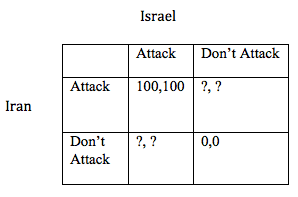Article : http://online.wsj.com/article/SB10000872396390444083304578016540325496354.html
The map of positive and negative relationships between countries is extremely confusing and complex. One day a country may be on positive terms with another, and the next, the same two countries may be on the brink of war. Throughout the 20th century, as well as the present era, there has been an enormous amount of conflict in the Middle East. Specifically, countries such as Israel and Iran, as well as Israel and Palestine (although it is not recognized as a country), have flooded national headlines with numerous, everlasting problems.
A recent article in the Wall Street Journal, written by Jay Solomon, documented the growing conflict between Iran and Israel. Mahmoud Ahmadinejad, the president of Iran, downplayed the idea of a military attack from Israel on his country. He also noted that, if an attack were to occur, the United States would be held responsible. It is actions/statements such as these that greatly affect strong and weak ties. For example, while Iran and the United States have had turbulent relations in the past, presently, they have been able to stifle such problems. If Israel were to attack, and Iran thus, were to hold the United States responsible, it is reasonable to assume that a weak tie would further develop between the two countries.
If this was to occur, and a weak tie was created between the United States and Iran, it would be interesting to see where the relationship between Israel and the United States went. Lets say there is an attack, and that the weak tie between the United States and Iran develops; it wouldn’t be wrong to suggest that a weak tie between Israel and the United States may develop. If the United States see’s Israel as a country going against its support, it wouldn’t be totally out of the question for relations to change. Furthermore, it would be interesting to see the development of relations between Iran and Israel. For, if both share a negative tie with America, by definition, they will develop a common tie between them.
Obviously, this hypothetical example is extremely complex. However, I think that it demonstrates how strong and weak ties, as well as positive and negative relationships, can be greatly changed by the several actions.
We can also apply this article to game theory. Lets assume we wont know the outcome of one country attacking, and the other country choosing not to attack. But, we will assume that if both attack, (100,100) will represent full-fledged war breaking out, and if both do not attack (0,0) will represent country relations to stay the same. While this example is difficult to understand given the uncertainty of the Matrix below, it serves as an example of the types of “games” that countries will become involve in with each other.
Israel and Iran Game Theory Matrix

– AMP
